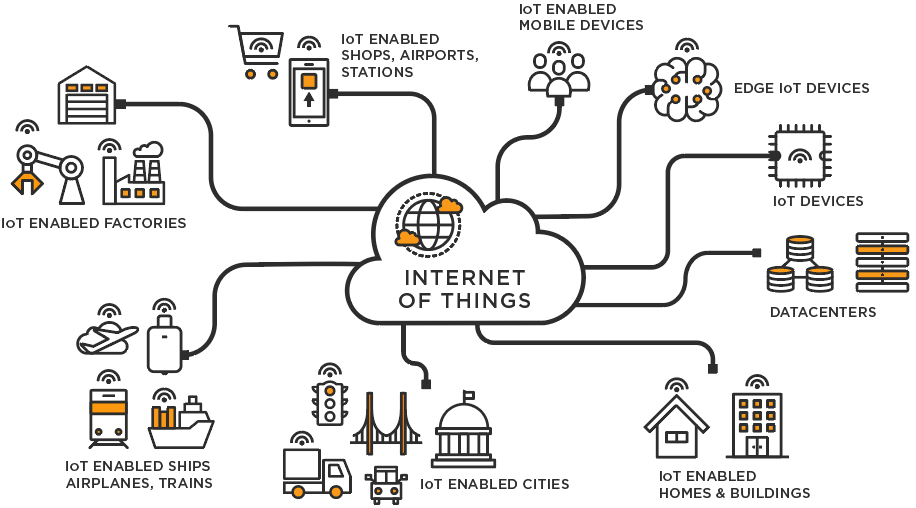Pros and Cons of Internet of Things (IoT)

IoT, or the Internet of Things, is a hot concept right now and is mentioned by every techie. It is a common item that many people use on a daily basis and has become essential to their way of life. This blog will cover the benefits and drawbacks of the Internet of Things (IoT). In the IoT ecosystem, there are billions of networked devices, but curiously, we humans have never noticed how much these devices communicate with one another or with one another’s machines. However, people are unaware that this is an Internet of Things (IoT) device.
Wireless networks are so commonplace that everything may have been switched on. A child’s toy or a driverless truck are both examples of IoT that have combined the physical and digital worlds.
According to Statista, there will be 21.5 billion active IoT-connected devices installed worldwide by 2025. In addition to all the ground-breaking findings, IoT has its own advantages and disadvantages. Here, we’ll see how IoT is enticing end-users with its alluring features and benefits while also revealing a negative side.
Let’s examine the benefits and drawbacks of the Internet of Things (IoT).
Top benefits of IoT:
Simple Access
IoT has a wide range of applications, but the majority of them take place in real-time. You only need a smartphone with internet access. When these two are together, you and your life become smarter. Imagine that technology controls every aspect of your daily life and is connected to them. How much simpler would your life be?
IoT-enabled gadgets will alert you by sending a text message to your phone when your refrigerator recognizes that you have run out of milk and contacts the closest supermarket to order the same quantity that you typically have.
It really does make things much simpler for us.
Let’s say your alarm goes off at six in the morning because you were too lazy to get up. When you turn off your alarm, it will connect to the geyser and heat the water to your preferred temperature. It will also direct the coffee maker to begin brewing the coffee at the same moment, all without waking you up.
Cities become "Smart Cities" thanks to wireless technologies
IoT-enabled gadgets automate everything and manage street lights to save electricity waste. It automatically turns off the street lights during the day and turns them on as dusk falls. You may check the vibrations of structures like buildings, bridges, and monuments to see if they are being overloaded with the aid of IoT devices. These are the ideal IoT in smart city examples. Schools and hospitals can manage noise pollution in the area and keep everyone calm.
Facilitates Communication
You can manage and automate taxes on a regular basis thanks to IoT, which promotes Machine-to-Machine (M2M) connectivity (the connection between devices).
According to Cisco, more than half of the 27.1 billion devices and connections in use today allow machine-to-machine communications.
Saves Money
According to a DHL analysis, IOT would enable businesses to cut productivity expenses by $1.2 trillion. Let’s examine its operation. Electronic appliances may now effectively connect with one another thanks to the Internet of Things, saving money and resources.
IoT improves our systems’ efficiency by enabling data exchange and communication across electronic devices and then converting it into the format we need.
Benefits to Businesses
With samples of data from your best customers, IoT will assist you in examining new business options. To find business insights and possibilities, it gathers data from the network and applies advanced analytics.
As a business owner, you may use the data gathered by IoT devices to forecast what your customers will want. You can use this to find new career opportunities and, consequently, new money sources.
Enhanced Efficiency
Any company’s profitability depends heavily on productivity. IoT increases corporate productivity, increases labor efficiency, eliminates skill mismatch, and provides employees with just-in-time training. We eventually find ourselves with a lot more free time.
First, complexity
There is a danger of failure with IoT. Let’s say you and your friend received notification that the milk packet stored in your refrigerator had expired. Therefore, both of you will buy a milk packet in this scenario. There will be two packages, which means money will be wasted.
This adds some complexity to the procedure overall. It would be a wise choice to register or connect only one of your numbers with the IoT equipped gadget in order to simplify this process.
Suitability
In the Internet of Things (IoT) ecosystem, there are millions and billions of connected devices, but since each device is made by a different manufacturer, tagging and monitoring become problematic. It is challenging to persuade each manufacturer that their products adhere to a single standard. Even if IoT devices are taking over the world, Bluetooth can link a variety of devices, but there may be compatibility problems.
Due to the compatibility issue, consumers may be forced to purchase gadgets from a single vendor, potentially leading to a monopoly. This adds some complexity to the procedure overall. It would be a wise choice to register or connect only one of your numbers with the IoT-equipped gadget in order to simplify this process.
Security or Privacy
Data that is transferred through IoT devices run the danger of losing its privacy. You should check the encryption of the data. IoT is experiencing privacy and security challenges as a result of its explosive expansion. While the data is being captured and communicated from the IoT device, IoT devices linked to your desktop or laptop raise the risk of revealing the customers’ personal information.
Due to the compatibility issue, consumers may be forced to purchase gadgets from a single vendor, potentially leading to a monopoly. This adds some complexity to the procedure overall. It would be a wise choice to register or connect only one of your numbers with the IoT-equipped gadget in order to simplify this process.
Lower Pay or Menial Workers
IoT is growing globally, which could lead to the replacement of boring and dangerous jobs that fire off unskilled professionals. All of this could lead to social problems with unemployment.
Daily tasks are being automated by IoT, therefore inevitably there will be less need for human resources and less qualified workers. Therefore, learning new methods of working will improve or maintain a person’s chances of finding employment.
Due to the compatibility issue, consumers may be forced to purchase gadgets from a single vendor, potentially leading to a monopoly. This adds some complexity to the procedure overall. It would be a wise choice to register or connect only one of your numbers with the IoT-equipped gadget in order to simplify this process.
Life Is Controlled by Technology
Almost every person’s life has been influenced by IoT in some way. Every generation, whether older or younger, is dependent on technology for even the smallest of daily tasks.
This dependence will increase even more in daily activities with the aid of IoT. Every technical application has some issues because no software is fault-free. Relying on IoT devices could be problematic in the event that an IoT infrastructure fails or crashes.
Where will IoT lead you next, then?
We cannot ignore the drawbacks of IoT, despite the fact that it has made life simpler and more intelligent. It is time to consider how to counteract its drawbacks and capitalize on the appropriate opportunities to make this technology function best for you.
It’s up to you how smartly you are directing your home and working environment by the domination of IoT enabled smart products. However, you also cannot disregard the drawbacks of IoT.
Keeping these factors in mind, hire the best IoT application development companies in India to construct your IoT app. These businesses can produce safe and scalable mobile apps based on the precise needs of the clients.
Frequently Asked Questions
- How do I define the internet of things?
The Internet of Things (IoT) is a network of various gadgets, including cars and home appliances, that are connected to the internet in order to share data and information. And the sharing of the data between people, things, or things-things is also possible. Any kind of combination is possible. - How does IoT operate?
The term “Internet of Things” (IoT) refers to all web-enabled devices that gather, send, and act on environmental data using embedded sensors, processors, and communication hardware. - Why should I spend money on the internet of things?
The following management benefit from IoT investment: Waste Management Done Right, Intelligent traffic management, Mechanism for managing garbage underground, and Intelligent Street Lighting.
